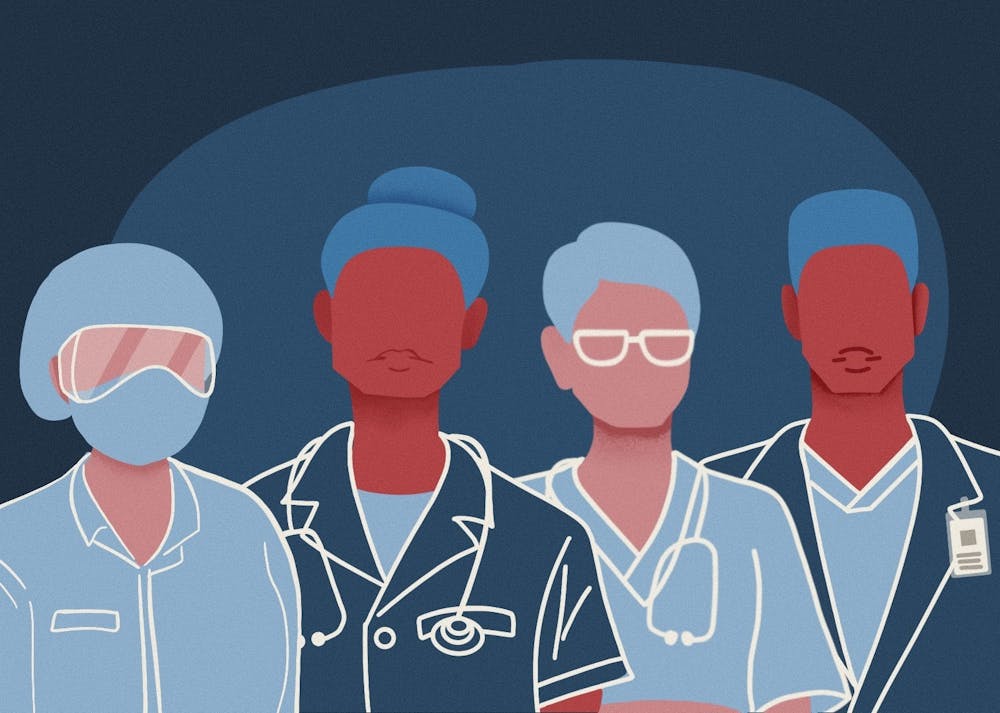Nursing is a highly valuable and skilled profession. However, social media has become inundated with discussions of a "mean nurse" stereotype, claiming nurses are often former high school bullies or "mean girls."
As nursing students go through their program at ASU, they may have to confront the realities and myths of this stereotype to forge the next generation of compassionate, capable nurses.
The "mean nurse" stereotype is often discussed in the context of nurses being cruel or unsupportive to each other. However, Dean of the Edson College of Nursing and Health Judith Karshmer says this discussion is not a new phenomenon.
"There has been a dialogue in the profession that nurses 'eat their young' for 50 years, ever since I've been with the field," Karshmer said.
Karshmer also said that too much focus is put on the bad behavior of some nurses, which both ignore the good work of most in the field and can create a self-fulfilling prophecy.
"We're in a hierarchical system in healthcare, and I think that, as often is the case, we adopt the expectations of the people who are hierarchically over us," Karshmer said. "(We're told) it's going to be hard, that you're not going to be treated well and then we behave in a way that makes that the case."
ASU nursing students also feel the influence of the "mean nurse" stereotype, both in social media discourse and in their time in clinical settings.
Laila Halvorsen, a third year student, is in the accelerated nursing program at ASU. She spoke about her awareness and experience with the "mean nurse" stereotype.
"It's upsetting to hear," Halvorsen said. "You second-guess yourself with everything, too, which can also be good. It's making sure to keep you in check."
Students studying nursing, or in the BSN program, have to complete eight 12-hour shifts per semester in a clinical setting, working one-on-one with a registered nurse. Unfortunately, this is where some student nurses see the "mean nurse" stereotype play out in real life.
"I did have a nurse that was very unkind and unprofessional while I was there," Halvorsen said. "But when working with my team and ASU in general, they handled it very well. (I) was removed from the environment and placed with the new nurse."
Elizabeth Wakefield, a junior in the nursing program, echoed this sentiment. She spoke about an experience with a nurse who was unnecessarily cold and did not explain procedures fully to Wakefield or her patients.
However, both Wakefield and Halvorsen sympathized with the nurses who were unkind to them and understood the risks of burnout and the intensity of nursing as a career.
"A lot of the nurses that have been there for a while get burned out a lot of the time," Halvorsen said. "There's a lot of stuff that goes on with nursing itself that could be changed … there's a lot of verbal abuse (or) physical abuse from patients that you have to deal with."
"A lot of them are saying that they don't have what they're promised when they were hired, or they have management who aren't doing management things and just let things slide, even if nurses say, 'This is what could make it better,'" said Wakefield.
Katalin Owens is a senior in the nursing program and the president of Nursing Students at Barrett. She discussed the steps she wants to take when she joins the profession to ensure future students do not have the same experience.
"I want to, in the future, just be nice to the nursing students so they feel comfortable in the environment they're in," Owens said. "How is the future generation going to know how to be a nurse?"
While steps should be taken to reduce the unkind behavior between a licensed nurse and a student nurse, the "mean nurse" stereotype may also start earlier in the highly competitive nursing program.
Andrea Hernandez is a junior studying mechanical engineering, but she started her time at ASU in the nursing program for three semesters. She spoke about the highly competitive and "cliquey" environment she sometimes experienced.
"We have to keep a certain GPA and certain grades; that's why it's very competitive," Hernandez said. "A lot of people don't help each other unless you're part of the same friend group. If you're not, then they don't because they're going to ruin the curve."
Students who are directly admitted to the nursing program must maintain a 3.5 minimum course GPA each semester, according to ASU Continuing Eligibility Criteria. Students who are not directly admitted or fall below eligibility requirements are able to compete for remaining spots in the program.
Hernandez said that many students who intend to compete for spots in the nursing program begin in the community health major, where they face an extra competitive environment while often experiencing disrespect from directly admitted nursing students.
"I have a few friends who (studied) community health and a lot of students that I met that were directly admitted would make fun of them for being community health … (saying) they weren't smart enough to get direct admission or say, 'I cannot imagine being (in) community health,'" Hernandez said.
"I remember a lot of people would mention that if they dropped to community health, then they wouldn't even want to continue doing the nursing route because community health was too degrading," Hernandez said.
Nursing is an intense career, which explains why the nursing major is so vigorous and competitive. However, this competition may contribute to the patterns of behavior that feed into the mean nurse stereotype.
Despite this, nursing students and ASU alumni are working to combat this stereotype and join the field.
Alexandria Ruiz is in her final term of the accelerated nursing program and is also the president of the Student Nurses' Association.
"Most (nurses) are very nice," Ruiz said. "The majority are very kind, and they're so eager to help out, especially since they've been in your position. But some of them are stuck in their ways, or they know their own schedule or system."
She spoke about the importance of finding community and working within a team in the profession.
"Once you form a sense of community, I don't think that there is an ability to have that hatred or that mean girl (behavior) if you're motivated about what you want to do," Ruiz said.
Ruiz also drew attention to the internal reflection required to become a good nurse.
"Be conscious of what you're delegating to other people, and also give yourself the grace to say, 'OK, I need help, but I’m not just going to throw it on someone else,'" Ruiz said.
But this issue goes beyond internal work and may require some interpersonal communication when faced with unkind behavior.
That's why Chris Chew, a recent ASU graduate, published a magazine article last March giving students and new graduates the tools to confront any bullying behavior in the profession head-on.
Even Krashmer is doing work to combat this stereotype within Edson College.
"We are constantly fighting this stereotype by framing the work in a very positive way, by framing our interactions with our colleagues in practice in a positive way and trying to inoculate our students from bias that sets them up to think that's how they're going to be treated," Karshmer said.
The mean nurse stereotype has plagued the career for decades, but new nurses join the field every day, unwilling to be deterred by unkind behavior and excited to provide care to those who need it.
Correction: A new header illustration was published at 8:40 p.m. on Feb. 8, 2024 to better represent those who work in and study nursing.
Edited by Sadie Buggle, Walker Smith and Grace Copperthite.
Reach the reporter at syramir2@asu.edu and follow @nerdyoso on X.
Like The State Press on Facebook and follow @statepress on X.
Sophia is a senior studying biological sciences. This is her fifth semester with The State Press. She has also worked as a science and technology reporter.




